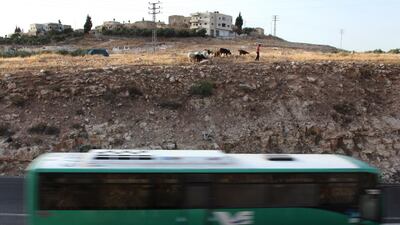It is nine years since Rosa Parks died, and a full 59 since she helped put a stop to segregated buses in the United States. In 1955, the 42-year-old African American refused to give up her seat to a white man and came to personify her country’s civil rights movement. Her defiance led to her arrest, but made her name a byword for freedom and justice, especially in the fight against inequality.
December 1, the date when the bespectacled seamstress refused to cede her seat on that Alabama bus, is officially Rosa Parks Day. It will have particular significance this year, because one of America's closest allies will soon use its own buses to further a long-established system of apartheid. Israel, an alleged democracy and the recipient of billions in American financial and military aid, is, subject to objections, set to ban Palestinian workers from travelling to their West Bank homes on the same buses as Jewish settlers.
In practical terms, the move initiated by Israeli defence minister Moshe Ya’alon is a disaster. Impoverished Palestinians are forced to seek low-paid jobs in Israel, usually on building sites, and already face long commutes. I have often taken buses from Ramallah, on the West Bank, to Jerusalem and every time Arabs on board were made to feel like criminals.
Before getting on, we had to go through a gated corridor – the kind you find in high security prisons – and then a militarised check point. Heavily armed soldiers carried out body searches. Many would-be passengers were denied entry into Israel for no apparent reason. For the rest of us, a journey that should have taken 15 minutes could take up to two-and-a-half hours.
Now it will be unlawful for any Palestinians to use the Trans-Samaria bus, which travels across the occupied West Bank to the settlement of Ariel. Instead, they will have to pass through the Eyal checkpoint, miles away from where most of them live, and then continue on a segregated bus. This is despite the Israeli army insisting that the security measures they impose on Arab workers guarantee safe journeys and prevent illegal overnight stays.
Israel’s liberal Haaretz newspaper accused Mr Ya’alon of giving in to ultra-right wing settlers, who – in the fashion of so many apologists for racism – regularly compile “evidence” of Arabs upsetting fellow passengers. Moti Yogev, of the pro-settler Habayit Hayehudi party, put it more bluntly, saying such public transport should be Jews-only because: “Riding these buses is unreasonable. They are full of Arabs.”
A recent Haaretz editorial on the subject sums up the level of discrimination involved: “The minister’s decision reeks of apartheid, typical of the Israeli occupation regime in the territories.”
Even the Israeli justice minister Tzipi Livni has used the word “apartheid” in relation to the buses, suggesting that Rosa Parks-style scenes have become commonplace. “It’s intolerable,” said Mrs Livni, referring to the settlers. “They claim that they need their own buses, because one Palestinian didn’t get up for a woman or an elderly person and another wasn’t nice to them. This is apartheid.”
It all adds to the endemically divided nature of Israel, a society uncomfortably similar to the racist Alabama of the 1950s, not to say apartheid-era South Africa.
Segregation has extended to Israel’s roads for years. This generally means modern highways for the Israelis and potholed tracks for the Palestinians. There is also the high security divide nicknamed “the apartheid wall” that runs for 690 kilometres. One of its main functions is to protect those responsible for the illegal land grabs and the demolition of Palestinian homes.
A new United Nations Human Rights Committee report calls on Israelis to end their institutionalised discrimination against Palestinians, citing 18 examples of the way they differentiate between the “Jewish and non-Jewish population” undermining the Palestinians’ right to self-determination.
Israel’s new president, Reuven Rivlin, last week admitted that “the Israeli Arab population has suffered for years from discrimination in budget allocation, education, infrastructure, and industrial and trade areas”.
Mr Ya’alon and his hardline cronies meanwhile try to justify the apartheid buses using the term “security”. It was the same cynically vague word that was bandied around during the summer war on blockaded Gaza.
As the oppression intensifies, and Israel proceeds with plans to build hundreds more illegal settler homes in East Jerusalem, while barring all worshippers from visiting the Al Aqsa Mosque for the first time since 1967, segregated transport once more becomes a symbol of extreme prejudice against a subjugated people.
More than half a century after Rosa Parks’s fabled commute, the world needs to evoke her legacy and demand an end to the injustice.
Nabila Ramdani is a French-Algerian journalist and broadcaster who specialises in Islamic affairs and the Arab world
On Twitter: @NabilaRamdani

